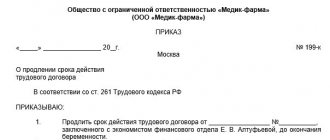Author of the article Alena Donmezova: Specialist in RKO
Publication date: 10/10/2019
Current for October 2021
In the article we will understand what an employment contract is and outline the terms of its validity. We also list the mandatory terms of the employment contract.
An employment contract is the main document that confirms the conclusion of an employment relationship between an employer and an employee. It is in writing in two copies. The first remains with the employer, the second is given to the employee. The employment contract specifies the mutual rights and obligations of both parties.
An employment contract is an agreement between an employer and an employee, according to which the employer undertakes to provide the employee with work for a specified job function, to ensure working conditions provided for by labor legislation <..> to pay the employee wages in a timely manner and in full, and the employee undertakes to personally perform certain by this agreement, the labor function in the interests, under the management and control of the employer, to comply with the internal labor regulations in force for this employer.
Article 56. Concept of an employment contract. Parties to the employment contract
An employment contract is an agreement between an employer and an employee, according to which the employer undertakes to provide the employee with work for a specified labor function, to provide working conditions provided for by labor legislation and other regulatory legal acts containing labor law norms, a collective agreement, agreements, local regulations and by this agreement, to pay the employee wages in a timely manner and in full, and the employee undertakes to personally perform the labor function defined by this agreement and to comply with the internal labor regulations in force for this employer.
(Part one as amended by Federal Law No. 90-FZ dated June 30, 2006)
The parties to the employment contract are the employer and the employee.
The concept of the subject
Subjects of labor law are persons who are subject to the norms of labor legislation, who have a certain set of rights and obligations, and are able to implement and fulfill them through their actions. Each of them has a set of characteristics.
- Legal capacity. It means the ability to have labor rights and bear responsibilities.
- Legal capacity. It presupposes the ability to independently exercise labor rights or fulfill obligations.
- Powerful powers. They do not apply to all participants in labor relations. We are talking about situations where an employer, institution or organization issues instructions that are binding on others.
Labor relations are distinguished by the simultaneous emergence of legal capacity and legal capacity among their subjects.
It is necessary to distinguish between labor and civil relations. The latter are possible in cases where a contract for the provision of services or performance of work is concluded.
Such situations do not imply that the parties have a special status provided for by the Labor Code of the Russian Federation.
Article 57. Contents of the employment contract
(as amended by Federal Law No. 90-FZ of June 30, 2006)
The employment contract specifies:
surname, name, patronymic of the employee and the name of the employer (surname, name, patronymic of the employer - an individual) who entered into an employment contract;
information about documents proving the identity of the employee and the employer - an individual;
taxpayer identification number (for employers, with the exception of employers - individuals who are not individual entrepreneurs);
information about the employer’s representative who signed the employment contract and the basis on which he is vested with the appropriate powers;
place and date of conclusion of the employment contract.
The following conditions are mandatory for inclusion in an employment contract:
place of work, and in the case when an employee is hired to work in a branch, representative office or other separate structural unit of the organization located in another area - place of work indicating the separate structural unit and its location;
labor function (work according to the position in accordance with the staffing table, profession, specialty indicating qualifications; specific type of work assigned to the employee). If, in accordance with this Code and other federal laws, the performance of work in certain positions, professions, specialties is associated with the provision of compensation and benefits or the presence of restrictions, then the names of these positions, professions or specialties and the qualification requirements for them must correspond to the names and requirements specified in qualification reference books approved in the manner established by the Government of the Russian Federation;
(as amended by Federal Law No. 13-FZ dated February 28, 2008)
the date of commencement of work, and in the case where a fixed-term employment contract is concluded, also the period of its validity and the circumstances (reasons) that served as the basis for concluding a fixed-term employment contract in accordance with this Code or other federal law;
terms of remuneration (including the size of the tariff rate or salary (official salary) of the employee, additional payments, allowances and incentive payments);
working hours and rest hours (if for a given employee it differs from the general rules in force for a given employer);
compensation for hard work and work under harmful and (or) dangerous working conditions, if the employee is hired under appropriate conditions, indicating the characteristics of working conditions in the workplace;
conditions that determine, in necessary cases, the nature of the work (mobile, traveling, on the road, other nature of work);
a condition on compulsory social insurance of the employee in accordance with this Code and other federal laws;
other conditions in cases provided for by labor legislation and other regulatory legal acts containing labor law norms.
If, when concluding an employment contract, it did not include any information and (or) conditions from those provided for in parts one and two of this article, then this is not a basis for recognizing the employment contract as not concluded or for its termination. The employment contract must be supplemented with missing information and (or) conditions. In this case, the missing information is entered directly into the text of the employment contract, and the missing conditions are determined by an annex to the employment contract or a separate agreement of the parties, concluded in writing, which are an integral part of the employment contract.
The employment contract may provide for additional conditions that do not worsen the employee’s position in comparison with established labor legislation and other regulatory legal acts containing labor law norms, collective agreements, agreements, local regulations, in particular:
on clarification of the place of work (indicating the structural unit and its location) and (or) the workplace;
about the test;
on non-disclosure of secrets protected by law (state, official, commercial and other);
on the employee’s obligation to work after training for no less than the period established by the contract, if the training was carried out at the expense of the employer;
on the types and conditions of additional employee insurance;
on improving the social and living conditions of the employee and his family members;
on clarification, in relation to the working conditions of a given employee, of the rights and obligations of the employee and the employer established by labor legislation and other regulatory legal acts containing labor law norms.
By agreement of the parties, the employment contract may also include the rights and obligations of the employee and employer established by labor legislation and other regulatory legal acts containing labor law norms, local regulations, as well as the rights and obligations of the employee and employer arising from the terms of the collective agreement and agreements . Failure to include any of the specified rights and (or) obligations of the employee and employer in the employment contract cannot be considered as a refusal to exercise these rights or fulfill these obligations.
Conditions without which you can’t
The same article. 57 of the Labor Code of the Russian Federation determines the terms of the employment contract, mandatory and additional. Please note: since 2006, the term “material terms” does not apply to employment contracts.
Mandatory terms of an employment contract include:
- Work start date. In some cases, it may differ from the date of signing the contract; draw the employee’s attention to this.
- Labor functions. The extent to which job responsibilities need to be specified in the contract depends entirely on the availability of job descriptions. In most cases, it is advisable to develop and approve job descriptions, which can be an appendix to the employment contract.
- Terms of remuneration. Salary, tariff rate or piece rates - this must be documented. In addition, indicate all kinds of additional payments: bonuses, overtime fees, compensation, etc. If they are specified in a local regulatory act, then make a reference to this document in the employment contract.
- Operating mode. Start and end times of the working day, lunch breaks, etc. If an employee is hired for shift work, the shift schedule is drawn up separately and brought to the attention of the employee against signature. The employment contract specifies only the mode of employment and a link to the regulatory document.
- Working conditions. On January 1, 2014, Federal Law No. 426 came into force, which obliges employers to conduct a special assessment of jobs and familiarize employees with its results against signature. When concluding an employment contract, the class of working conditions and characteristics of the workplace are included in the contract. If a special assessment of jobs in the organization has not been carried out, please clarify that the special assessment activities will be carried out in accordance with current labor protection legislation, and the results will subsequently be indicated in an additional agreement to the employment contract.
- Insurance. Include in the contract a clause on the mandatory types of insurance that the employer provides to its employees: pension, social, medical.
Article 58. Duration of the employment contract
Employment contracts can be concluded:
1) for an indefinite period;
2) for a certain period of not more than five years (fixed-term employment contract), unless a different period is established by this Code and other federal laws.
A fixed-term employment contract is concluded when the employment relationship cannot be established for an indefinite period, taking into account the nature of the work to be done or the conditions for its implementation, namely in the cases provided for in part one of Article 59 of this Code. In the cases provided for in part two of Article 59 of this Code, a fixed-term employment contract may be concluded by agreement of the parties to the employment contract without taking into account the nature of the work to be performed and the conditions for its implementation.
(Part two as amended by Federal Law No. 90-FZ of June 30, 2006)
If the employment contract does not specify the duration of its validity, the contract is considered to be concluded for an indefinite period.
In the event that neither party has requested termination of a fixed-term employment contract due to its expiration and the employee continues to work after the expiration of the employment contract, the condition on the fixed-term nature of the employment contract loses force and the employment contract is considered concluded for an indefinite period.
(Part four as amended by Federal Law No. 90-FZ of June 30, 2006)
An employment contract concluded for a specific period in the absence of sufficient grounds established by the court is considered concluded for an indefinite period.
(as amended by Federal Law No. 90-FZ of June 30, 2006)
It is prohibited to conclude fixed-term employment contracts in order to evade the provision of rights and guarantees provided for employees with whom an employment contract is concluded for an indefinite period.
(as amended by Federal Law No. 90-FZ of June 30, 2006)
The employer as a participant in labor relations
The status of employer is defined in Art. 22 Labor Code of the Russian Federation. In addition to rights and obligations, the law gives him a number of powers. An example is the ability to adopt local acts that employees must obey. The most common ones include internal labor regulations. Unlike employees, employers can be not only individuals.
Organizations
The vast majority of such subjects of labor law have the status of a legal entity. Their features are provided for in Art. 48-49 of the Civil Code of the Russian Federation and include the following:
- the presence of property secured by legal right;
- liability for obligations within owned property;
- legal personality that appears at the time of state registration and ends upon liquidation or termination of activity as a result of reorganization.
When concluding an employment contract, a citizen should make sure that the employer has the status of a legal entity. To do this, he may require company documents (charter, certificate of registration, extract from the state register and a decision on the appointment of a manager). An alternative is online services that allow you to find out information about a company by registration number (OGRN or TIN). If the fact of its liquidation is revealed, the employment contract will be considered not concluded.
As a rule, agreements with employees are signed by the head of the company, but by his order he can delegate these powers to another employee. In the latter case, you must request the text of this document.
The only exception in which an organization may not have the status of a legal entity is trade unions. We are talking about situations where they represent the interests of workers in negotiations or during conflicts.
Individual entrepreneurs
The status of such citizens in labor law is in many ways similar to organizations. Individual entrepreneurs are subject to registration, which is confirmed by a certificate. Data on this status can also be clarified on special online portals.
As a general rule, a citizen can engage in entrepreneurial activity from the age of 18. The exception is when a teenager has been engaged in business since the age of 16. If a future employee is faced with such a situation, then the presence of an individual entrepreneur registration certificate will guarantee the employer’s legal capacity.
When business is carried out without registration, the law protects workers. They will be subject to all guarantees provided for when concluding employment agreements with registered individual entrepreneurs.
Individuals who are not individual entrepreneurs
In some cases, ordinary citizens can act as employers. This option is provided if they require help with housekeeping or personal services. An example is the involvement of housekeepers or nannies.
Unlike individual entrepreneurs, ordinary individuals cannot issue local acts binding on employees.
All terms of interaction between the parties to labor relations must be reflected in the text of the contract. An employer can be a fully capable citizen who has reached 18 years of age. The law provides for the following exceptions:
- emancipated persons (who received full legal capacity until the age of 18);
- if teenagers over 14 years of age have their own income, they can also hire workers with the consent of a guardian or legal representative;
- Citizens with limited legal capacity will also need their own income and the consent of a trustee to hire an employee.
In situations where care is necessary for an incapacitated citizen, a guardian can enter into an agreement on his behalf.
Having understood the rules of the Labor Code of the Russian Federation governing the status of participants in labor relations, potential parties to the agreement will receive complete information about the requirements for the employee and ways to check a number of the employer’s documents. This will significantly reduce the risks of breaking the law and will increase mutual trust between the parties.
Article 59. Fixed-term employment contract
(as amended by Federal Law No. 90-FZ of June 30, 2006)
A fixed-term employment contract is concluded:
for the duration of the performance of the duties of an absent employee, whose place of work is retained in accordance with labor legislation and other regulatory legal acts containing labor law norms, a collective agreement, agreements, local regulations, and an employment contract;
for the duration of temporary (up to two months) work;
to perform seasonal work, when, due to natural conditions, work can only be carried out during a certain period (season);
with persons sent to work abroad;
for carrying out work that goes beyond the normal activities of the employer (reconstruction, installation, commissioning and other work), as well as work related to a deliberately temporary (up to one year) expansion of production or the volume of services provided;
with persons entering work in organizations created for a predetermined period or to perform a predetermined job;
with persons hired to perform obviously defined work in cases where its completion cannot be determined by a specific date;
to perform work directly related to the internship and professional training of the employee;
in cases of election for a certain period to an elected body or to an elective position for paid work, as well as employment related to the direct support of the activities of members of elected bodies or officials in state authorities and local self-government bodies, in political parties and other public associations;
with persons sent by employment services to temporary work and public works;
with citizens sent to perform alternative civil service;
in other cases provided for by this Code or other federal laws.
By agreement of the parties, a fixed-term employment contract may be concluded:
with persons entering work for employers - small businesses (including individual entrepreneurs), the number of employees of which does not exceed 35 people (in the field of retail trade and consumer services - 20 people);
with age pensioners entering work, as well as with persons who, for health reasons, in accordance with a medical certificate issued in the manner established by federal laws and other regulatory legal acts of the Russian Federation, are allowed to work exclusively of a temporary nature;
with persons entering work in organizations located in the Far North and equivalent areas, if this is related to moving to the place of work;
to carry out urgent work to prevent disasters, accidents, accidents, epidemics, epizootics, as well as to eliminate the consequences of these and other emergency circumstances;
with persons elected through a competition to fill the relevant position, conducted in the manner established by labor legislation and other regulatory legal acts containing labor law norms;
with creative workers of the media, cinematography organizations, theaters, theatrical and concert organizations, circuses and other persons involved in the creation and (or) performance (exhibition) of works, in accordance with the lists of works, professions, positions of these workers, approved by the Government of the Russian Federation Federation, taking into account the opinion of the Russian Tripartite Commission for the Regulation of Social and Labor Relations;
(as amended by Federal Law No. 13-FZ dated February 28, 2008)
with managers, deputy managers and chief accountants of organizations, regardless of their legal forms and forms of ownership;
with persons studying full-time;
with crew members of sea vessels, inland navigation vessels and mixed (river-sea) navigation vessels registered in the Russian International Register of Vessels;
(paragraph introduced by Federal Law dated November 7, 2011 N 305-FZ)
with persons applying for part-time work;
in other cases provided for by this Code or other federal laws.
Documents to be presented when applying for a job. Employment history
Article 65 of the Labor Code of the Russian Federation determines the list of documents that a citizen presents to the employer when concluding an employment contract:
1) passport or other identity document.
The passport can be replaced by another document identifying the citizen:
a) birth certificate - for persons under 16 years of age; b) a foreign passport - for citizens permanently residing abroad who are temporarily in the territory of the Russian Federation; c) identity card - for military personnel (officers, warrant officers, midshipmen); d) military ID - for soldiers, sailors, sergeants and foremen doing military service by conscription or contract; e) a certificate of release from places of imprisonment - for persons released from places of imprisonment; f) other documents issued by internal affairs bodies identifying the citizen;
2) work record book, with the exception of cases when an employment contract is concluded for the first time or the employee starts working on a part-time basis;
3) insurance certificate of state pension insurance;
4) military registration documents - for those liable for military service and persons subject to conscription for military service.
When hiring, the employer has the right to demand from citizens who are in the reserve military tickets (temporary certificates issued in place of military tickets), and from citizens subject to conscription for military service - certificates of citizens subject to conscription for military service;
5) a document on education, qualifications or special knowledge - when applying for a job that requires special knowledge or special training.
Taking into account the specifics of the work, the employer has the right to require the submission of additional documents:
1) medical report on health status;
2) certificates from the Federal Tax Service regarding the provision of information on property status. In some cases, when hiring, citizens must undergo a mandatory medical examination and provide the employer with a medical certificate. In accordance with Art. 266 of the Labor Code of the Russian Federation, persons under the age of 18 are hired only after a preliminary compulsory medical examination and subsequently, until they reach the age of 18, are subject to a compulsory medical examination annually. A medical certificate must be presented to persons applying for work in public catering, trade, food industry, work directly related to the movement of vehicles, etc.
It is prohibited to demand from a person applying for a job documents that are not required by law.
A work book is a document of the established form, which is the main confirmation of the employee’s work activity and length of service.
An employer (except for an individual employer) is obliged to keep a work book for each employee who has worked in an organization for more than 5 days, if the work in this organization is the main one for the employee.
The form, procedure for maintaining and storing work books, as well as the procedure for producing work book forms and providing them to employers are established by Decree of the Government of the Russian Federation of April 16, 2003 No. 225 “On work books”.
Work records are kept in Russian, and on the territory of a republic within the Russian Federation that has established its own state language, along with the Russian language, they can also be kept in the state language of that republic.
During work, the work book is kept by the employer and is given to the employee upon dismissal on the day of dismissal.
The registration of a work book for an employee hired for the first time is carried out by the employer in the presence of the employee no later than a week from the date of hiring.
Entries about work performed, transfer to another permanent job, qualifications, dismissal, as well as awards made by the employer are entered into the work book on the basis of an order no later than a week. Upon dismissal, entries are made on the day of dismissal and must correspond to the text of the order. All entries are made without abbreviations and have a serial number.
Information about penalties is not entered into the work book (except for dismissal).
The employer is obliged, upon a written application from the employee, no later than 3 days from the date of its submission, to issue the employee with a copy of the work book or a certified extract from the work book.
The employer is obliged to familiarize each entry made about work performed, transfer to another permanent job and dismissal to its owner against a signature in his personal card.
At the request of the employee, information about part-time work is entered into the work book at the place of main work.
Entries in the work book about the reasons for termination of the employment contract must be made in strict accordance with the wording of the Labor Code of the Russian Federation or federal laws and with reference to the relevant article and paragraph of the Labor Code of the Russian Federation.
The work book is issued to the employee on the day of dismissal. If there is a delay due to the fault of the employer or an incorrect entry is made, the employer is obliged to compensate the employee for the earnings he did not receive during the delay.
Article 61. Entry into force of an employment contract
An employment contract comes into force from the day it is signed by the employee and the employer, unless otherwise established by federal laws, other regulatory legal acts of the Russian Federation or the employment contract, or from the day the employee is actually admitted to work with the knowledge or on behalf of the employer or his representative.
(as amended by Federal Law No. 90-FZ of June 30, 2006)
The employee is obliged to begin performing his job duties on the date specified in the employment contract.
If the employment contract does not specify the start date of work, the employee must begin work on the next working day after the contract enters into force.
(as amended by Federal Law No. 90-FZ of June 30, 2006)
If the employee does not start work on the start day of work established in accordance with part two or three of this article, then the employer has the right to cancel the employment contract. A canceled employment contract is considered unconcluded. Cancellation of an employment contract does not deprive the employee of the right to receive benefits for compulsory social insurance in the event of an insured event during the period from the date of conclusion of the employment contract until the day of its cancellation.
(Part four as amended by Federal Law No. 90-FZ of June 30, 2006)
List of documents for drawing up an employment contract
An employment contract must be signed; it is not enough to get by with an order and an entry in the work book. If such a situation arises, then this is a direct violation of labor laws. However, an employment contract is considered concluded if the employee began work with the permission of the employer or his authorized representative.
To hire an employee, you need to ask him for a package of documents:
- passport;
- work book;
- TIN;
- SNILS;
- educational documents;
- military registration document, if the citizen is liable for military service;
- medical certificate (if necessary).
A medical certificate is required if a minor is hired. In addition, the certificate must be provided to drivers, security guards, cooks, doctors, etc.
Requirements for a remote employment contract according to the Labor Code
Legislators placed general requirements for an employment contract in Article 57 of the Labor Code. This article divides the TD into three mandatory parts:
- place, time of imprisonment;
- explanation of the parties;
- mandatory conditions.
| If you are faced with an unusual situation when drawing up such an agreement, our distance learning course will help you navigate and solve the problem. |
Place and time of signing a remote employment contract
In a remote work agreement, the location of the employee does not matter. An important condition, which is stated in the document, will be the location of the employer and the address of the organization. This is stated in Article 312 of the Labor Code. The conclusion date will be the day, month and year when the employment contract for remote work is signed by both participants.
Information about the parties to the employment agreement
The text of the contract contains information about the employee and the employer. A list of this information is given in the TC.
If the specifics of future activities require entering extended information about the employee, they are indicated only after they have provided consent to the processing of personal data.
This provision does not apply to the employer - any information of his choice is included in the text, there are no restrictions here.
Responsibility for violation of the terms of the employment contract and for its absence
The legislation does not establish an exact list of violations by the employer of the terms of the employment contract, since the list is extensive. The most common forms of these violations are the following:
- imposing disciplinary sanctions on employees who refuse to perform work not included in the terms of the employment contract;
- non-payment of wages for more than 2 months;
- irregular working hours not provided for in the employment contract;
- refusal to provide paid leave due to the employee;
- dismissal of an employee without the reasons provided for by the Labor Code of the Russian Federation;
- violation of working conditions provided for by law, collective agreement and employee’s employment contract;
- failure to comply with obligations to provide guarantees and compensation provided for by law or employment contract;
- failure to hand over a copy of the employment contract more than 3 days after admission to work;
- violation of the two-month period within which the employer had to notify the employee of a change in the terms of the contract signed with him;
- payment of salaries to employees less than once every half month (Article 36 of the Labor Code of the Russian Federation);
- lack of full payment to the employee on the day of dismissal in accordance with Art. 140 Labor Code of the Russian Federation.
The Code of Administrative Offenses of the Russian Federation allocates in paragraph 4 of Art. 5.27 violations related to the lack of an employment contract with the employee:
- evasion of execution of a contract;
- improper execution of an employment contract;
- conclusion of a civil contract that actually regulates labor relations between the employee and the employer.
Employees have the opportunity to defend their labor rights; if they are violated, the employer is subject to sanctions
For the absence of an employment contract with an employee, the employer who committed this offense for the first time is subject to an administrative fine, the amount of which varies. If the violation is committed repeatedly, then the punishment is more severe - up to the disqualification of the head of the organization (Clause 5, Article 5.27 of the Code of Administrative Offenses of the Russian Federation).
Pros and cons of working under an employment contract
The main advantage of working under an employment contract is that the employer pays the required social contributions for the employee. Therefore, the employee earns seniority and pension points, i.e., takes care of his old age.
An obvious advantage is also the employer’s obligation to provide the employee with annual paid leave. And in the event of an accident or illness confirmed by a certificate of incapacity for work from a doctor, sick days will also be paid. The amount of this payment may be equal to actual earnings for the same number of working days or be slightly less - it depends on the total length of service. Pregnant employees will be able to receive maternity leave paid in the amount of their actual earnings.
It is also important that Art. 60 of the Labor Code of the Russian Federation prohibits an employer from requiring an employee to perform work not stipulated by an employment contract. This, of course, does not apply to employees who have not concluded an employment contract, i.e., working unofficially. And even if such an employee suffers an injury at work that deprives him of his ability to work, it will be very difficult for him to prove in court that this is precisely a work-related injury. Accordingly, the size of the disability pension will not be comparable.
From the above, we can conclude that there are simply no serious disadvantages for an employee in working under an employment contract. But working without a contract is very beneficial for dishonest employers.
However, having looked at the statistics of so-called gray wages for 2016–2017, we see that approximately a third of employed Russians work without a contract. The experience of my friends and relatives allows us to conclude that this is not their will. The choice actually remains with the employer, who benefits from not paying insurance premiums, having disenfranchised employees, paying wages with delays, or paying much less than agreed upon. This is a unique “advantage” of working without an employment contract.
The percentage of people employed without an employment contract in Russia has been stable for a decade








